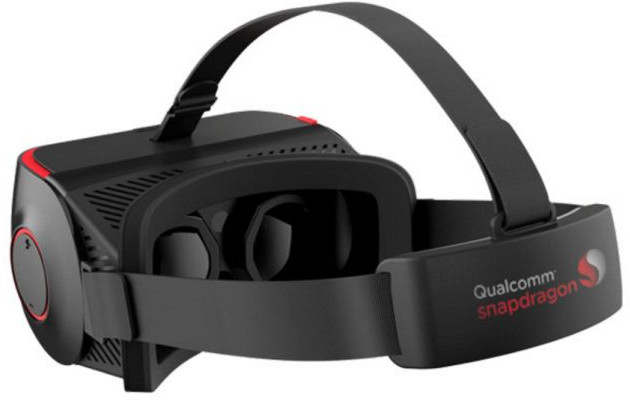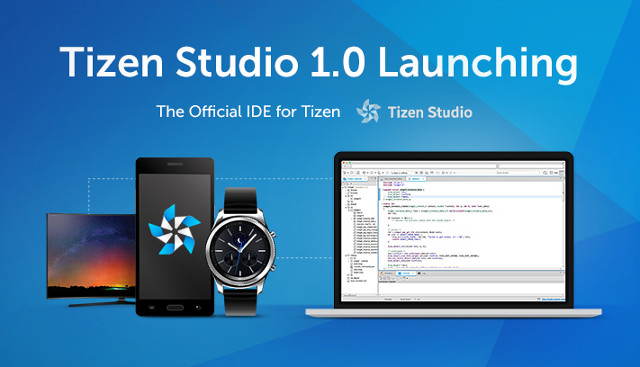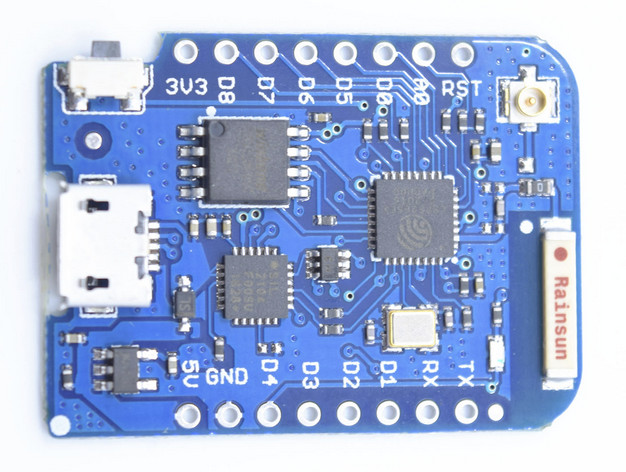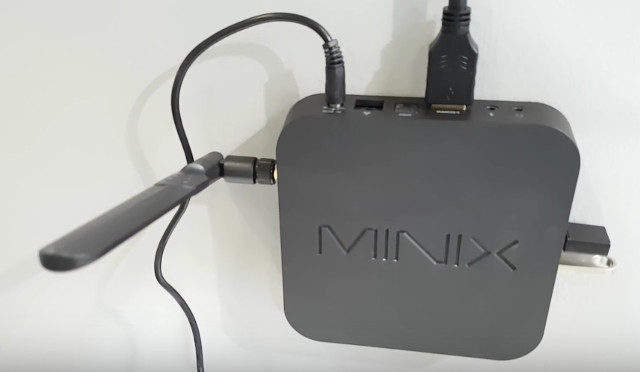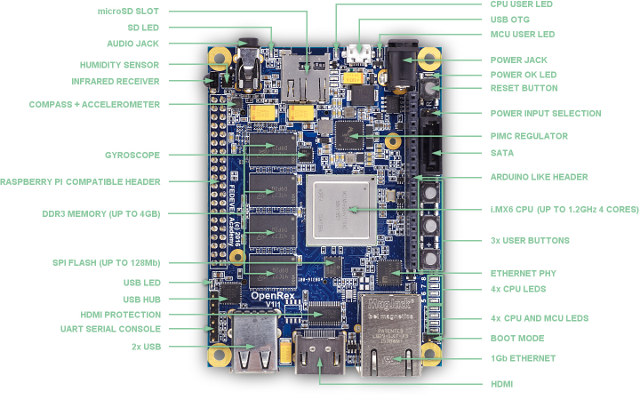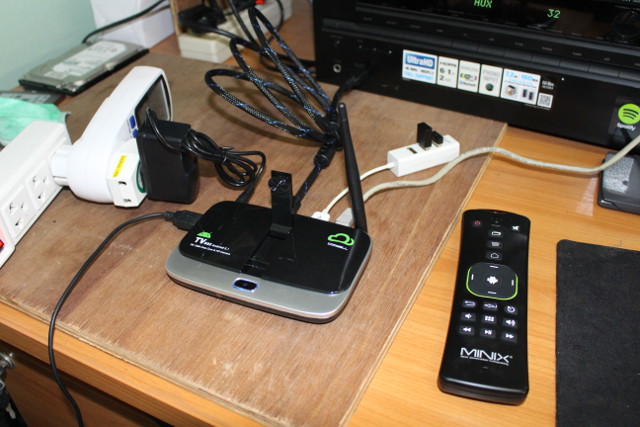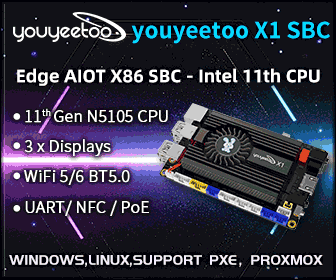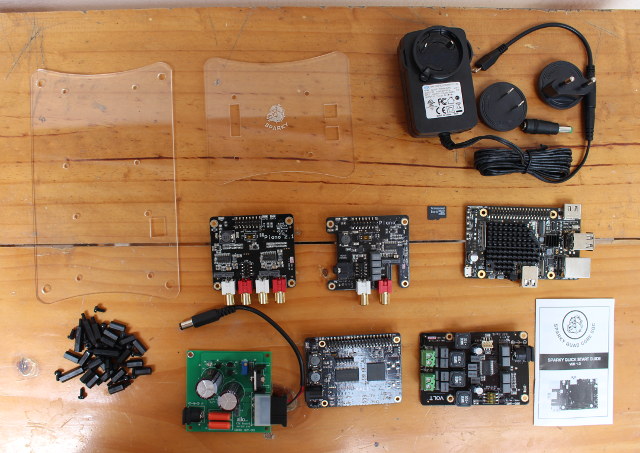Qualcomm has recently announced two references platforms for ODM/OEM powered by Snapdragon 820 processor for 4K Ultra HD media boxes and all-in-one virtual reality headsets. Snapdragon VR820 Virtual Reality HMD Qualcomm Snapdragon VR820 VR headset comes with the following key features and specifications: SoC – Qualcomm Snapdragon 820 quad core Kryo processor with Adreno 530 GPU System Memory – Go figure Storage – Only god knows Display – 1440×1440 resolution per eye, AMOLED panel that supports up to 70Hz Audio – 4x microphones with Fluence HD noise filtering and active noise cancellation Video – 360° 4K video playback processing with HEVC compression and display refresh rates at 70 FPS Cameras – Integrated eye tracking with two cameras, dual front facing cameras for six degrees of freedom (6DOF) Sensors – gyro, accelerometer, and magnetometer sensors The reference platform, developed in collaboration with Goertek, leverages Qualcomm’s Virtual Reality SDK, and is expected […]
Tizen Studio 1.0 Replaces Tizen SDK for Smartphones, Wearables and TVs
Tizen has converged all Tizen SDK for mobile, wearables, and TV to Tizen Studio since the beginning of the month, and released Tizen Studio 1.0 for developers interested in developing app for Tizen smartphones, TVs and/or smartwatches such as the latest Samsung Gear S3. So instead, you’ll now be able to select the targets platform and profiles within Tizen Studio. Some of the key changes made to the development environment in Tizen Studio 1.0 include: Launching tools: Installer, Uninstaller, and Package Manager Developing tools: IDE perspective theme, Project Wizard, Certificate Manager, and Menu and tool icons UI tools: UI Builder, Component Designer, and EDC Editor Testing tools: Emulator Testing tools: Dynamic Analyzer for memory and CPU profiling Other improvements in Tizen application development environment Tizen Studio is available for the 32-bit and 64-bit version of Windows, and Ubuntu, as well as for Mac OS with one version with the graphics […]
$5 Wemos D1 mini Pro ESP8266 Board includes 16MB Flash
Wemos D1 mini is one of my favorite ESP8266 development boards thanks to its small size, shield support, and low $4 price tag. There’s now a new version of the board – dubbed Wemos D1 mini Pro – with 16MB flash instead of 4MB for the original version, and a few other modifications. Wemos D1 mini Pro specifications: WiFi 802.11 b/g/n module based on ESP8266EX with 16 MB flash, chip antenna and external antenna connector Expansion – Through holes with 11x digital input/output pins (3.3V) supporting interrupt/PWM/I2C/one-wire (except D0 pin) 1x analog input (3.3V max input) Reset and power signals (5V, 3.3V, GND) USB – micro USB port Misc – Reset button Power – 5V via micro USB or 5V pin Dimensions – 34.2 x 25.6 mm Weight – 2.5 grams Beside the larger flash, the main differences are listed in a Wemos forum post: External antenna connector – switch […]
MINIX NEO U9-H 4K HDR Amlogic S912-H Android TV Box Coming in October
MINIX may have officially announced MINIX NEO Z83-4 Cherry trail mini PC at IFA 2016, but they also showcased NEO U9-H Android TV box based on an “Octa-core cortex A53 processor with ARM Mali-820MP3 GPU”, which the company confirmed to be Amlogic S912-H processor with Dolby and DTS licenses. I also asked the company whether they had specs sheet for the new model, but the replied they did not have finalized specifications to share, nor exact pricing and release date. But we can still derive info from a video on HDBlog.it showcasing an early development model at IFA 2016. MINIX NEO U9-H preliminary specifications: SoC – Amlogic S912-H octa-core ARM Cortex A53 processor @ up to 1.5 GHz with ARM Mali-820MP3 System Memory – 2GB DDR3 Storage – 16GB eMMC flash and micro SD card slot Video Output – HDMI 2.0 up to 4K @ 60Hz with CEC, HDCP 2.2, […]
OpenRex Open Source Hardware NXP i.MX6 Board Launched for 199 Euros and Up
OpenRex is an open source hardware board powered by NXP i.MX6 Cortex A9 processor designed by Fedevel for their hardware design course, and manufactured by Voipac, both companies based on Slovakia. The schematics, PCB layout, gerber files and other manufacturing files were released in February, but the company has only started selling the board a few days ago with OpenRex Basic SBC and OpenRex Max SBC boards. OpenRex Basic and Max boards specifications: SoC OpenRex Basic – NXP i.MX 6Solo single core Cortex A9 processor @ 1 GHz with 2D and 3D GPU OpenRex Max – NXP i.MX 6Quad quad core Cortex A9 processor @ 1 GHz with 2D and 3D GPU MCU – NXP LPC1345FHN33 ARM Cortex-M3 micro-controller @ 72 MHz System Memory Basic – 512 MB DDR3-1066 (400MHz) Max – 2GB DDR3-1066 (533 MHz) Storage Basic – micro SD slot, 1x 2Kbit I2C EEPROM, 1x 32Mbit SPI flash Max […]
Coowell V4 Android TV Box Review – Part 2: Camera, Skype, Google Hangouts and Duo
Coowell V4 Android TV box is based on Rockchip RK3368 octa-core processor with 2GB RAM, and 16GB flash, and also includes a camera. In part 1 of Coowell V4 review, I have already taken photos of the device, and torn down the device to have a closer look at the board, and the camera which is based on a GC2145 2MP image sensor. Today, I’ll mostly test the camera and microphone, including firmware compatibility with Skype, Google Hangouts, and the latest Duo by Google app. Finally, it’s been a while since I’ve tested a RK3368 TV box, so I’ll run CPU-Z and Antutu again. Coowell V4 Hardware Setup and Launcher Coowell V4 hardware setup is pretty usual, and I connect an Ethernet port, and the USB RF dongle for MINIX NEO A2 Lite air mouse, as well as a USB keyboard to take screenshots. However, while normally I’d use my […]
Allo Sparky Audio Kit Combines an ARM Linux Board with Amplifier, Audio DAC, Reclocker and Capacitance Multiplier Boards
Last year I wrote about Allo Sparky SBC Linux and Android development powered by Actions Semi S500 quad core Cortex A9 processor, which mostly differentiates itself from the competition by the many add-on boards for audio, VoIP, and IoT (WiFi+Bluetooth+Zigbee ). While most of development boards are manufactured in China, Allo company is based in India, and all boards are manufactured there, which could be a benefit to Indian readers who want to avoid potential custom issues with other boards. The company has shipped me their complete audio development kit, and I’ll first check out the hardware, before taking time to experiment with the kit in a few weeks or months… I could find 6 different boards in the kit, which I detailed below, as well as a 5V/3A power supply with AU and EU adapter, a micro USB adapter, a micro SD card apparently pre-loaded with Ubuntu 12.04, a […]
How Fix Apps Crashing at Launch in Android 6.0 (in Mediatek Phones) ?
I’ve recently received a new Android 6.0 Marshmallow smartphone powered by Mediatek Helio X20 processor, namely Vernee Apollo Lite, and one of the issues I encountered is that some applications such as Firefox and MAPS.ME would crash when I tried to launch them. The problem was reproducible 100% of the time, and occurred from the very first time I tried to start the app. I’d get a message like “Unfortunately MAPS.ME has stopped” with two buttons: REPORT or OK. So I asked on Vernee forums to report the issue, and see if other people had the same problem. One replied had the same problem, but a simple reboot would fix the issue, while the other proposed to clear the cache. I had not considered that option since the crash occurred from the very first time, but I tried anyway. Go to the App list, drag and drop the problematic app […]


